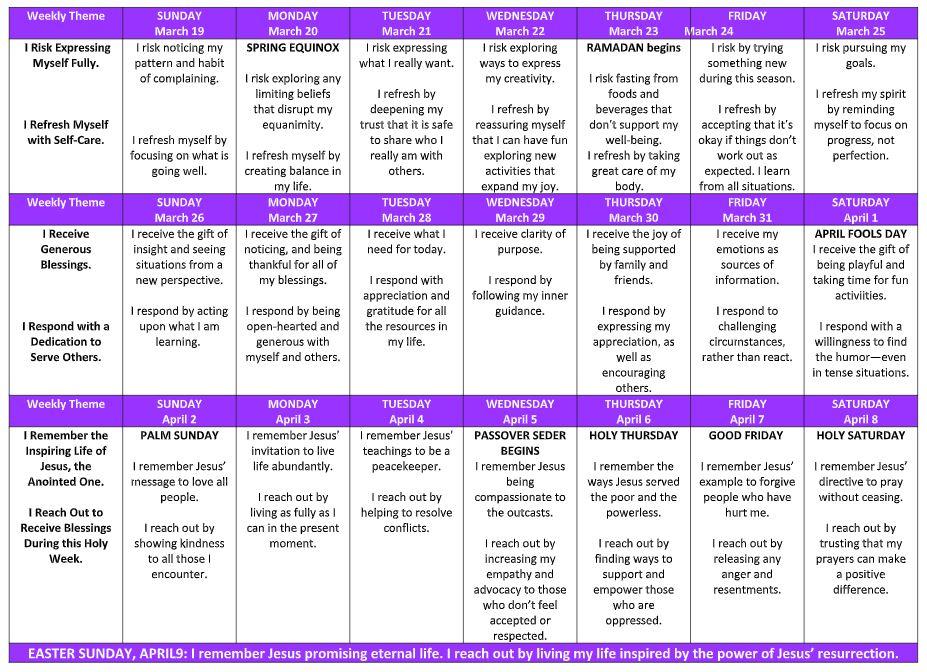Why Is Lent an Important Season?
Commentary by Susie Leonard Weller
Growing up in a devout Roman Catholic home, the Lenten Season meant giving up all types of sweets for 40 days. I’d gorge on all of my favorite treats the day before on Mardi Gras knowing that I’d be fasting from them for the next six weeks. My mom tried to “sweeten” the season by setting out a wire basket with pebbles. For every good deed I did during Lent, I could put a tiny rock into the basket that would be transformed into candy on Easter Sunday morning. Perhaps this was her Catholic version of a sticker chart rewarding any positive behavior.
As an adult, I’ve expanded my appreciation for the diverse gifts of the Lenten Season. The word “Lent” has various meanings. According to the Collins Dictionary, the Ango-Saxon root of “Lencten” means Spring in Latin and the lengthening of the hours of daylight. It also signifies 40 days. In many faith traditions, the number 40 symbolizes key events. For example, both Moses and Jesus waited 40 days and nights before receiving God’s guidance.
Many ancient spiritual traditions within Buddhism, Judaism, Christianity and Islam, have encouraged people to practice the discipline of fasting. For Christians, these 40 days (excluding Sundays) are a special time to prepare for Easter and the awareness of God’s Presence in our life. In a similar way, the four weeks of Ramadan within the Islamic tradition, remind us of the powerful benefits of fasting, praying and donating to those in need.
Current researchers also promote the value of fasting. A popular method called “Swedish Intermittent Fasting” encourages people to limit their food consumption to specific hours within a day. It is also known as the 16/8 Method which suggests that people only eat within an 8-hour time frame, and fast during the other 16 hours of the day. Other nutritionists promote fasting from food once a week for 24 hours to improve our health.
“The Intermittent Fasting 101 – The Ultimate Beginner’s Guide” by Kris Gunnars suggests that fasting has many health benefits beyond weight loss. It can improve brain and heart health, adjust our hormone levels, make stored body fat more accessible, lower insulin levels, initiate cellular repair and increase our metabolic rate.
I’ve noticed that the self-discipline skills that I learn through fasting are a gateway for helping me to release my other addictions and attachments. As difficult as it is for me to give up sugar, it is even more challenging to let go of my habit of harshly judging myself and others. The Lenten Season invites me to replace this negative pattern by increasing positive practices — such as expanding my capacity for compassionate acceptance of who and what I don’t have control over.
James Clear, author of “Atomic Habits” and founder of the Habits Academy, writes: “Every action you take is a vote for the type of person you will become. We all deal with setbacks, but in the long run, the quality of our life often depends on the quality of our habits.” Even small adjustments, such as making a 1% positive change on a daily basis, can add up to making a big difference in our life.
Since it often requires an extended period of time to create a new habit, Lent is a wonderful opportunity to practice healthier behaviors. In the charts below, I’ve provided a short reflection for each day during the Lenten Season. For easy reference, I’m describing them as the “7 ‘R’s’ for Reflection.”
Each week has a specific focus. For example, the first week begins with reflecting upon any regrets and expressing remorse by making amends. The second week invites you to examine any rifts in your relationships and to repair any ruptures. The third week encourages you to demonstrate greater respect for others and to resolve to be an effective bridge-builder. The fourth week urges you to examine and release any habits that are diminishing you and restore greater harmony in your life. The fifth week supports you to risk expressing yourself more fully and to support this process by refreshing yourself with self-care. The sixth week nurtures you to graciously receive generous blessings and to respond by finding ways to serve others. The seventh week, or Holy Week, focuses on remembering the life of Jesus, the Anointed One, and reaching out to receive the blessings from this sacred time.
This year, Holy Week for Christians also coincides with the beginning of the Jewish Passover Seder and the continuation of the Islamic Month of Ramadan. With increased religious and political tensions in our world, let’s make it a priority during this Lenten Season to “sweeten” our world by honoring the many paths celebrating God’s Presence and guidance in our life.










